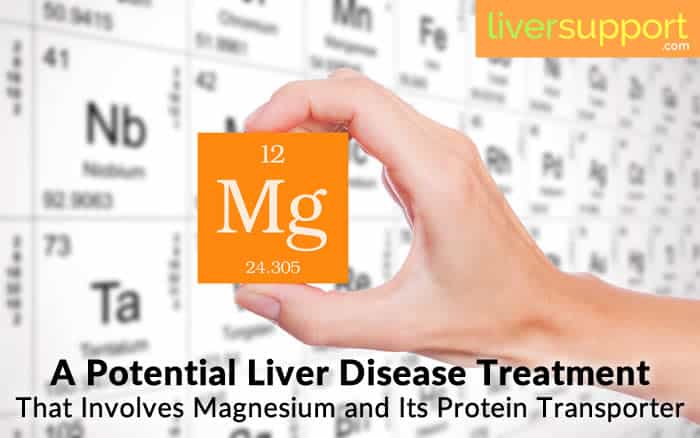
Previous
The 5 Best and Worst Foods for Your Liver

Next
Top 7 Springtime Veggies & Their Liver Health Benefits
A Potential Liver Disease Treatment That Involves Magnesium and Its Protein Transporter
Discover magnesium’s relationship with your liver, as well as its possible role in a new liver disease treatment.
Our diet plays a huge role in overall health, and when we’re not getting in enough essential vitamins and minerals, we could be putting ourselves at higher risk of disease. With non-alcoholic steatohepatitis (NASH), a form of fatty liver disease, impacting 1.7 billion people worldwide, it’s no surprise researchers want to find a solution.
The Relationship Between Magnesium and Your Liver
Magnesium is an important nutrient for our health. It is a part of many different processes, such as: (1)
- Regulating muscle and nerve function
- Regulating blood sugar levels
- Regulating blood pressure
- Making protein, bone, and DNA
The liver is also an important organ where it’s involved in metabolism, immune response, and regulating the transportation and distribution of many trace elements – including magnesium.
Many people who have liver disease are also deficient in magnesium, which can make the condition become worse. According to a 2019 article (2), every 100 milligram (mg) increase in magnesium intake results in a 49% decrease in the mortality from all liver diseases.
This includes:
- Liver cirrhosis
- Alcoholic liver disease (ALD)
- Liver cancer
- Viral hepatitis
What the Research is Saying
According to a recent 2021 study published in the Journal of Hepatology (3) it was found that both patients and mice that had non-alcoholic steatohepatitis also had high amounts of cyclin M4 (CNNM4) protein. This protein has a job of transporting magnesium out of the liver. It is the responsible party behind the imbalance of magnesium levels that can lead to liver disease development.
“These patients have an altered magnesium export machinery that increases the vulnerability of their liver to suffer inflammatory processes, development of fibrosis and fat deposition,” Malu Martinez Chantar, first author in the publication, told NYU in an interview (4). “This study also presents a novel therapeutic approach based on GalNAc-siRNA technology that specifically targets the liver by modulating CNNM4 levels. The CNNM4 molecule developed from Silence Therapeutics’ proprietary mRNAi GOLD (GalNAc Oligonucleotide Discovery) Platform effectively protects from liver pathology in preclinical models of steatohepatitis.”
To make things a little less complicated, basically siRNA (short-interfering RNA) is a drug that has shown potential to treat various diseases including cancer and Parkinson’s disease. N-acetylgalactosamine (GalNAc) siRNA was developed specifically for liver delivery. (5)
With this treatment targeting CNNM4 and decreasing its quantity – steatosis, inflammation, and fibrosis are all alleviated in NASH models. Not only that, but it helps magnesium accumulate back into the liver (versus the blood) and reduces stress on the endoplasmic reticulum (an important transportation system).
In the end, this research confirms that magnesium is important for liver health. “With insight into how this essential metal affects lipid metabolism at the cellular level, possible therapeutic targets for this and other liver pathologies start emerging,” stated Daniela Buccella, study co-author, in the same interview.
Adding Magnesium to Your Diet
Getting magnesium into your diet is fairly easy, with it being found in several different foods and available in supplements.
The amount you need each day is dependent on age and sex: (1)
- Men: 400 to 420 mg
- Women: 310 to 320 mg
- Pregnant women: 350 to 360 mg
You’re likely to hit your recommended daily intake by eating foods such as:

- Legumes, nuts, seeds, whole grains, and green leafy vegetables
- Fortified breakfast cereals and other fortified foods
- Milk, yogurt, and some other milk products
Unfortunately, many diets in the U.S. aren’t meeting their magnesium recommended intake, with the National Health and Nutrition Examination Survey (NHANES) stating that number is as high as 79% of U.S. adults. (4)
Always check with your doctor first, but a magnesium supplement may be beneficial to ensure you’re hitting your daily intake. Magnesium is also often found in multivitamins and other dietary supplements. According to the National Institute of Health (1), the easily digested forms of magnesium in supplements include:
- Magnesium aspartate
- Magnesium citrate
- Magnesium lactate
- Magnesium chloride
If you’re looking for a multivitamin supplement, look no further than Natural Wellness’s iron-free multivitamin – which contains chelated magnesium – another easily absorbed form.
Conclusion
Researchers are diving deeper into the treatment of non-alcoholic fatty liver disease, and this study just opened up an unexplored window. Further research needs to be completed to ensure this treatment is effective on humans and not just animals.
- Office of dietary supplements - Magnesium. (n.d.). Retrieved April 01, 2021, from https://ods.od.nih.gov/factsheets/Magnesium-Consumer/
- Liu, M., Yang, H., & Mao, Y. (2019). Magnesium and liver disease.Annals of Translational Medicine, 7(20), 578-578. doi:10.21037/atm.2019.09.70
- Simón, J., Goikoetxea-Usandizaga, N., Serrano-Maciá, M., Fernández-Ramos, D., Sáenz de Urturi, D., Gruskos, J. J., . . . Martínez-Chantar, M. L. (2021). Magnesium accumulation UPON CYCLIN M4 Silencing activates microsomal triglyceride transfer protein Improving nash.Journal of Hepatology. doi:10.1016/j.jhep.2021.01.043
- Communications, N. (2021, March 02). Protein controlling magnesium identified as therapeutic target for non-alcoholic fatty liver disease. Retrieved April 01, 2021, from https://www.nyu.edu/about/news-publications/news/2021/march/magnesium-fatty-liver-disease.html
- Springer, A. D., & Dowdy, S. F. (2018). Galnac-sirna conjugates: Leading the way for delivery of rnai therapeutics.Nucleic Acid Therapeutics, 28(3), 109-118. doi:10.1089/nat.2018.0736






